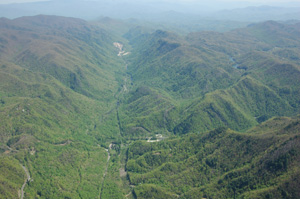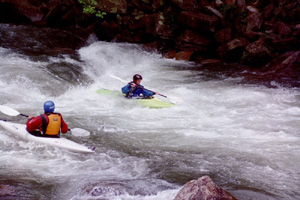 The Nantahala is one of the most popular whitewater rivers in the nation and the world. Forgiving class II+ rapids, fine water quality and scenery, reliable dam releases almost every day, the security of a nearby road, and a large number of rafting and kayaking outfitters all contribute to its attractiveness for beginner and intermediate paddlers. Just upstream however lies a Class IV/V reach known as the Cascades and a Class III/IV reach called the Upper Nantahala that were mostly dewatered for many decades.
The Nantahala is one of the most popular whitewater rivers in the nation and the world. Forgiving class II+ rapids, fine water quality and scenery, reliable dam releases almost every day, the security of a nearby road, and a large number of rafting and kayaking outfitters all contribute to its attractiveness for beginner and intermediate paddlers. Just upstream however lies a Class IV/V reach known as the Cascades and a Class III/IV reach called the Upper Nantahala that were mostly dewatered for many decades.
The Nantahala dam relicensing process secured the recreational opportunities on the class II+ Lower reach, as well as to provided several releases each year on the Class III-V Upper reaches. Several access areas were created as part of the relicensing process as well.
From 2001 through 2003 American Whitewater participated in an innovative negotiation process to decide the future operations of the dams.  AW staff attended full-day meetings at least once a month for 3 years, and spent countless hours analyzing and assisting with studies, and developing proposals. We focused our efforts on whitewater paddling mitigation, the design of a environmental enhancement fund, and the removal of Dillsboro Dam on the Tuckasegee. We worked closely with other stakeholders including our volunteers, the Carolina Canoe Club, local outfitters, Duke Power, and state and federal agencies throughout the process.
AW staff attended full-day meetings at least once a month for 3 years, and spent countless hours analyzing and assisting with studies, and developing proposals. We focused our efforts on whitewater paddling mitigation, the design of a environmental enhancement fund, and the removal of Dillsboro Dam on the Tuckasegee. We worked closely with other stakeholders including our volunteers, the Carolina Canoe Club, local outfitters, Duke Power, and state and federal agencies throughout the process.
Based on three years of work and negotiations, AW signed a settlement agreement in 2003 calling for sweeping environmental and recreational enhancements in the Nantahala, Tuckasegee, and Little Tennessee watersheds. The controversial removal of Dillsboro Dam on the Tuckasegee River resulted in significant delays in FERC's license issuance. American Whitewater was a vocal advocate for the removal of Dillsboro Dam and for prompt licensing of the related hydropower projects. The dam was removed in 2009, and FERC issued the new license for the Nantahala Hydroelectric Project on February 8, 2012.
Whitewater releases began on the Upper Nantahala in September of 2012, and have proven very popular. New access areas were constructed in 2013 and 2014. American Whitewater continues to work with Duke Energy and other stakeholders each year on the management of these popular recreation opportunities.
